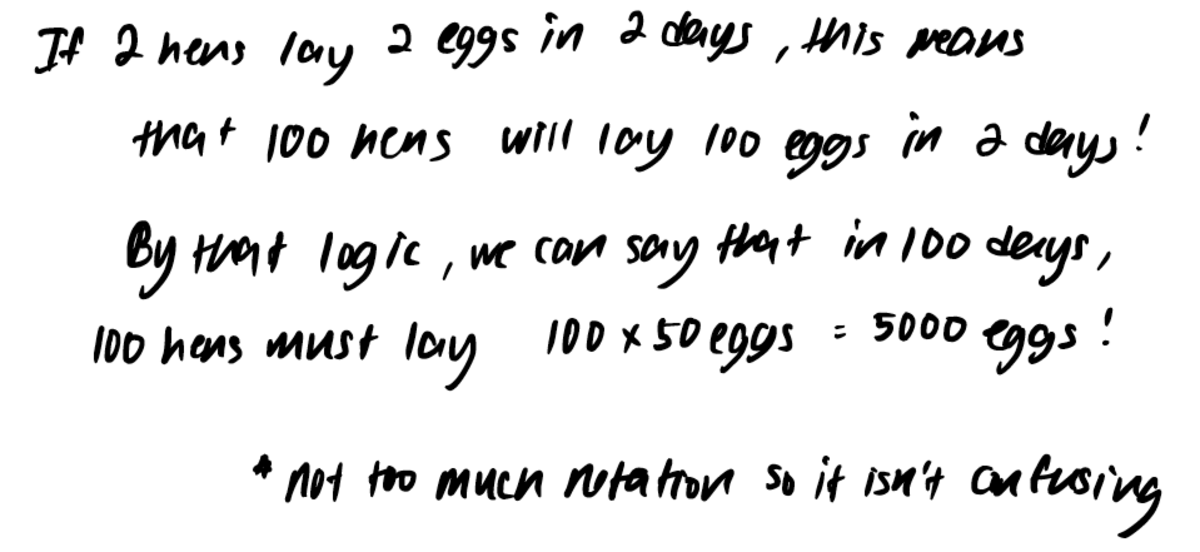How many eggs?
If 2 hens lay 2 eggs in 2 days, how many eggs will 100 hens lay in 100 days?
The answer is 5000.
This section requires Javascript.
You are seeing this because something didn't load right. We suggest you, (a) try
refreshing the page, (b) enabling javascript if it is disabled on your browser and,
finally, (c)
loading the
non-javascript version of this page
. We're sorry about the hassle.
13 solutions
Wow! Good job
Another way is: 1. 2 hens will lay 2 eggs in 2 days means that 100 hens will lay 100 eggs in 2 days 2. Since 2 50=100, that means that 100 hens will lay 100 50=5000 eggs in 100 days
Log in to reply
Sorry, the '250' was supposed to be 2 times 50 and the '10050' was supposed to be 100 times 50
The eggs which hatch can in turn hatch eggs too. Why aren't we considering that?
Log in to reply
You need males to fertilize the eggs.
Log in to reply
So why are they giving eggs without males?
Log in to reply
@Priyanshu Rai – I was saying the eggs would not be chicken because they were not fertilized.
The best explanation
simple unitary method can be used to solve the problem. in 2 days 2 hens lay 2 eggs. in 1 day 2 hens lay 2 2 eggs. in 100 days 2 hens lay 2 1 0 0 ∗ 2 eggs. in 100 days 1 hen lays 2 ∗ 2 1 0 0 ∗ 2 eggs. in 100 days 100 hens lay 2 ∗ 2 1 0 0 ∗ 1 0 0 ∗ 2 eggs = 5000 eggs.
Mathematically this works, but you can't say that in 1 day 2 hens lay 2/2 eggs. In 1 day, no eggs are produced. From the problem, it takes each hen 2 days to lay an egg. How many eggs would 100 hens lay in 3 days?
2 hens lay 2 eggs in 2 days, so 100 hens lay 50x2 = 100 eggs in 2 days, so 100 hens lay 50x100 = 5000 in 50x2 =100 days. Ed Gray
It takes each hen 2 days to produce 1 egg, or 1 egg/ 2 days. In a 100 day time-span, 1 hen would produce 50 eggs, which can be found by [100 days x ( 1 egg/2 days) = 50 eggs]. Since we have 100 hens and each hen produces 50 eggs over the 100 day time span, we can multiply [100 hens x (50 eggs/1 hen)] to find the total amount of eggs.
Wow great font and writing.
2 hens lay 2 eggs in 2 days. Accordingly 100 hens will lay 100 eggs in 2 days. And to calculate the number of eggs that 100 hens will lay in 100 days, we have to multiply 100 by 50.(100/2=50) So the answer is, 100*50=5000
- 2 hens lay 2 eggs in 2 days ⟹ 1 hen lays 1 egg in 2 days
- 1 hen lays 50 egg in 100 days
- 100 hen lay (100 × 50) eggs in 100 days
- = 5000 eggs
- One hen - 0,5 egg per day
- 100 hens - 50 eggs per day
- 100 hens in 100 days - 50 * 100 = 5000
If you do this in maths this works but in reality how can a hen lay half an egg!?!?
If 2 hens lay 2 eggs in 2 days, 1 hen lays 1 egg in 2 days which means it lays 50 eggs in 100 days. This means 100 hens will lay 100 x 50 = 5000 eggs.
- How many eggs can one hen lay in 2 days?
- How many eggs can one hen lay in 100 days?
By backtracking, 1 hen produces 0,5 eggs in 1 day. With 100 hens, that's 50 eggs a day, and with 100 days, that's 5 0 0 0 eggs.
2 hens in 2 days lay 2 eggs
2 hens in 100 days lay 100 eggs (Take any multiple of 2, as they lay eggs on alternate days --> 2 hens in 4 days lay 4 eggs, 2 hens in 6 days lay 6 eggs, 2 hens in 20 days lay 20 eggs & so on)
2 x 50 hens in the 100 days lay 100 x 50 eggs
That is; 100 hens in 100 days lay 5000 eggs
100 hens will lay 2 50 50 eggs in 100 days are $\boxed{5000}$ eggs in one-hundred days.

Two hens lay 2 eggs in 2 days means 1 hen lay 1 egg in 2 days. Therefore, in 100 days, 1 hen lays 2 1 0 0 = 5 0 eggs and 100 hens lay 1 0 0 × 5 0 = 5 0 0 0 eggs.